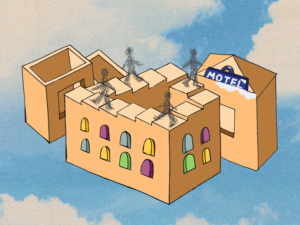That uncomfortable squirm in your stomach is not the 5th cup of coffee this time. Housing selection is upon us. It’s all most of us are thinking about, it’s largely what we are talking about, and, with Georgetown’s premature exit from March Madness, it’s now the hot topic of debate on campus.
I’m usually opposed to the vocabulary most students use to describe their endeavors here. I think many resort to “impossible,” “uncomfortable,” or “stressful” as space fillers when they don’t have anything else to say. A friend told me, however, that the onset of housing selection meant “a lot of drama is about to start.” He even issued a dire warning: “People lose friends.”
That concept is legitimately stressful to me. Deciding who to live with involves value judgements of other people that are uncomfortable to give and even harder to receive. The process that goes into finding the “best” housing at Georgetown conflates strategizing and cutthroat cruelty.
If there are little ways to cheat the system and get an edge on housing, they aren’t well publicized (for your edification: you should have your list of choices ready before selection begins, because you only get 60 seconds to look at options! “What’s a Hoya?” can make a big difference! Squat for someone while they go abroad!). The whole process is shrouded in secrecy and subterfuge. We face each other in a competition where few (perhaps only the Stewards) know the rules. This all might not matter if it weren’t for the emotional vulnerability inherent in making the living decision.
I am going into housing selection with three people (though someone told me you can go in with groups larger than four now?): a junior and two freshman. We want a five-person apartment so we can pull in a fellow sophomore. One of our freshmen has been to all of the “What’s a Hoya?” sessions, while the other has not; it would be strategic to substitute the sophomore for that second freshman in our group of four. In that situation, we would almost definitely be able to pull in the first freshman; but, with her in our group, the second freshman may not have the same luck.
As complicated as that was for me to type out and you to read, so are many groups’ tentative housing situations. We float through practical snares and half-willed commitments until this gut-check week when the math kind of matters and the prospect of isolation looms large. I recognize the privilege we have to be able to pick who we want to live with in college—but the emotional politics that go into that coordination seem unnecessarily painful. Some lucky people find three other friends with just the same hopes for living and number of housing points, but they seem to be a minority. It seems unfair to cater to them while housing incurs moderate identity crises in many of the rest of us.
So what to do? Part of me thinks the whole system just needs to be simplified. Here’s an idea: Apartments with more than four spaces go to seniors. Four-person apartments belong to juniors, then sophomores; freshmen only live in doubles. People can still apply for exemptions, but regular students must live with others in the same grade in designated spaces. Henles could be for juniors, for example, while only sophomores live in Village B. We would still need a lottery to assign apartments within grades, but we wouldn’t need a point system. Limited options for housing also means limited options for maneuvering and scheming.
My suggestion takes freedom away from students in the housing selection process, but leaves in place the ability to choose roommates or housemates. It creates fewer options, which makes decisions simpler. It places responsibility on students to coordinate living in a group by the time they are seniors, but absolves everyone of the burden of getting the “best” housing by choosing the “best” roommates each year. Less wiggle room means fewer opportunities for ideal housing but also rids the moment when one person gets pulled up and leaves others tenuous and searching. More importantly, more rules might change the atmosphere surrounding housing.
This week shouldn’t feel like a battle where anyone can be cut down and left in the cold at any time.






